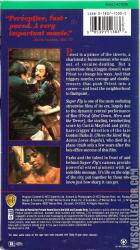Super Fly
Catalog Number
11138
-
Primary Distributor (If not listed, select "OTHER")
Catalog Number
11138
Primary Distributor (If not listed, select "OTHER")
Release Year
Country
N/A (NTSC)
N/A | N/A | N/A
N/A | N/A
Super Fly (1972)
Additional Information
Additional Information
Never a dude like this one! He's got a plan to stick it to The Man!
All He Needed Was One Last Deal...
An African-American man finds that leaving behind his life of crime is harder than he imagined in this groundbreaking crime drama. Priest (Ron O'Neal) is a stylish and successful cocaine dealer who drives a fancy car, commands a small army of street salesmen, and lives a life of luxury. However, Priest is just smart enough to know that there's no real future in dealing coke, and one day he makes a proposal to his partner Eddie (Carl Lee) -- they take their 300,000-dollar savings, buy 30 kilos of cocaine, and use their street team to move it out in four months, leaving a million dollar profit for both Priest and Eddie, allowing them to get out of the business for good. Eddie is wary but willing to go along, but Scatter (Julius Harris), a former dealer who set Priest up in the cocaine trade, is both unwilling and unable to sell them that much product. As Priest looks for a new source for his big score, one of his underlings, Fat Freddie (Charles McGregor) is picked up by the police, and under violent interrogation, Freddie tells the cops about Priest's underground empire. When Priest is confronted by the police, however, he learns they're less interested in putting him behind bars than in making him a partner. While Superfly was a box-office smash and (along with Shaft and Sweet Sweetback's Baadasssss Song) one of the key films of the nascent blaxploitation movement of the early '70s, it's best remembered today for the soundtrack composed and performed by Curtis Mayfield, which included the hit songs "Freddie's Dead," "Pusherman," and the title tune. ~
The movie was controversial.[6] At least one critic has suggested that the film's glorification of drug dealers serves to subtly critique the civil rights movement’s failure to provide better economic opportunities for black America and that the portrayal of a black community controlled by drug dealers serves to highlight that the initiatives of the civil rights movement were far from fully accomplished.[7]
However the filmmakers maintain that it was their desire to show the negative and empty aspects of the drug subculture. This is evident in the movie from the beginning as Priest communicates his desire to leave the business. Nearly every character in the film, with the notable exception of his "main squeeze," tries to dissuade Priest from quitting; their chief argument being that dealing and snorting are the best he ever could achieve in life.
The film was re-released in 1973 and earned $2 million in North American rentals.[8]
Release Date: August 5, 1972
Distrib: Warner Brothers
All He Needed Was One Last Deal...
An African-American man finds that leaving behind his life of crime is harder than he imagined in this groundbreaking crime drama. Priest (Ron O'Neal) is a stylish and successful cocaine dealer who drives a fancy car, commands a small army of street salesmen, and lives a life of luxury. However, Priest is just smart enough to know that there's no real future in dealing coke, and one day he makes a proposal to his partner Eddie (Carl Lee) -- they take their 300,000-dollar savings, buy 30 kilos of cocaine, and use their street team to move it out in four months, leaving a million dollar profit for both Priest and Eddie, allowing them to get out of the business for good. Eddie is wary but willing to go along, but Scatter (Julius Harris), a former dealer who set Priest up in the cocaine trade, is both unwilling and unable to sell them that much product. As Priest looks for a new source for his big score, one of his underlings, Fat Freddie (Charles McGregor) is picked up by the police, and under violent interrogation, Freddie tells the cops about Priest's underground empire. When Priest is confronted by the police, however, he learns they're less interested in putting him behind bars than in making him a partner. While Superfly was a box-office smash and (along with Shaft and Sweet Sweetback's Baadasssss Song) one of the key films of the nascent blaxploitation movement of the early '70s, it's best remembered today for the soundtrack composed and performed by Curtis Mayfield, which included the hit songs "Freddie's Dead," "Pusherman," and the title tune. ~
The movie was controversial.[6] At least one critic has suggested that the film's glorification of drug dealers serves to subtly critique the civil rights movement’s failure to provide better economic opportunities for black America and that the portrayal of a black community controlled by drug dealers serves to highlight that the initiatives of the civil rights movement were far from fully accomplished.[7]
However the filmmakers maintain that it was their desire to show the negative and empty aspects of the drug subculture. This is evident in the movie from the beginning as Priest communicates his desire to leave the business. Nearly every character in the film, with the notable exception of his "main squeeze," tries to dissuade Priest from quitting; their chief argument being that dealing and snorting are the best he ever could achieve in life.
The film was re-released in 1973 and earned $2 million in North American rentals.[8]
Release Date: August 5, 1972
Distrib: Warner Brothers
Related Links
Related Releases1
Catalog Number
05-04652
Primary Distributor (If not listed, select "OTHER")
Super Fly (1972)
Release Year
Catalog Number
05-04652
Primary Distributor (If not listed, select "OTHER")
Catalog Number
05-04652








Comments0
Login / Register to post comments